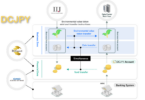WePower, a blockchain startup backed by Japan’s Marubeni, has unveiled a new solution to enable corporates to easily buy renewable energy in a typical e-commerce experience. Mojo Power, an Australian electricity retailer, is the first to use the white-labeled marketplace known as Elemental.
WePower tokenizes power contracts, enabling the energy to be fractionalized. But if a corporate has bought more energy than it needs, it can also resell it. In many countries, a consumer or business can easily switch between electricity utilities. The aim is to make it just as easy to secure electricity from a renewable source.
Typically renewable energy is bought by a corporate or utility from a renewable producer through a formal Power Purchase Agreement (PPA). This usually involves a set amount of electricity for a fixed period of several years. What happens if the company moves? So PPA’s are not flexible and it’s a non-trivial amount of work.
WePower has previously worked with Mojo, and that work has now been standardized for other retailers in its Elemental solution. So retailer Mojo entered into a PPA agreement with the Robinvale Solar Farm in Victoria. And that power has been tokenized so that Mojo can sell blocks of energy to different buyers, and the power buyer can resell unused amounts.
“Mojo is eliminating the dependence on the complicated energy procurement procedures and enabling companies of all sizes to buy local green energy with full transparency easily,” said Mojo’s Managing Director Warren Murphy.
Apart from enabling retailers to launch renewable products targeted at corporate clients, WePower Elemental also makes it easier for electricity retailers to contract with renewable producers.
Meanwhile, other blockchain initiatives fostering renewable energy consumption are on the rise. Peer-to-Peer trading (P2P) seems to be a common solution that enables households and businesses to trade their excess solar energy. Australia’s Power Ledger has carried out P2P trials in India and Austria. The Tokyo Institute of Technology also partnered with Mitsubishi Electric Corporation to develop a P2P energy trading blockchain platform. Renewable energy certificates (RECs) are another common application. Thai energy company PTT developed a blockchain-based marketplace for renewable energy certificates in collaboration with the Energy Web Foundation.






